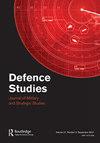Five good reasons for NATO’s pragmatic approach to offensive cyberspace operations
Q1 Arts and Humanities
引用次数: 2
Abstract
ABSTRACT For decades, few NATO members, predominantly the US, had the capabilities to conduct offensive cyberspace operations (OCO). Today more than half of NATO’s members have, or are acquiring, offensive cyberspace operations capabilities (OCOC). Historically, NATO’s planning and coordination is based on shared knowledge of the members’ military capabilities, to a degree even their nuclear capabilities. In the cyber domain, the principle has evolved to include allies’ emerging defensive cyber capabilities. NATO’s approach to OCOC, however, deviates radically: NATO’s doctrine merely integrates OCO’s effects, that is, allow members to contribute with OCOs in operations without sharing information with allies on what OCOCs are available or how the OCOs deliver the effects. OCOC’s technical and tactical characteristics incentivize NATO’s members to keep OCOCs secret, also from allies. This results in a dilemma: Either the allies providing OCOC’s effects risk sharing sensitive information on the means, or the allies, who depend on the provided effects, act without sufficient knowledge of the deployed OCOCs to assess their efficacy, legality, or impact on own offensive or defensive cyber operations. NATO’s limited approach to OCOC is a pragmatic mitigation of the dilemma that allows NATO to train and develop doctrine in the field further.北约对网络空间进攻行动采取务实态度的五个充分理由
摘要几十年来,很少有北约成员国(主要是美国)有能力开展进攻性网络空间行动。如今,超过一半的北约成员国已经或正在获得进攻性网络空间作战能力。从历史上看,北约的规划和协调是基于对成员国军事能力的共同了解,在某种程度上甚至是其核能力。在网络领域,这一原则已经发展到包括盟国新兴的防御网络能力。然而,北约对OCOC的做法却发生了根本性的偏离:北约的原则只是整合了OCO的效果,即允许成员国在行动中与OCO一起做出贡献,而不与盟国分享关于哪些OCOC可用或OCO如何产生效果的信息。OCOC的技术和战术特点激励北约成员国对OCOC保密,也对盟国保密。这导致了一个困境:要么提供OCOC效果的盟友有分享手段敏感信息的风险,要么依赖所提供效果的盟友在对部署的OCOC没有足够了解的情况下采取行动,以评估其有效性、合法性或对自身进攻或防御网络行动的影响。北约对OCOC的有限方法是对这一困境的务实缓解,使北约能够在该领域进一步训练和发展学说。
本文章由计算机程序翻译,如有差异,请以英文原文为准。
求助全文
约1分钟内获得全文
求助全文

 求助内容:
求助内容: 应助结果提醒方式:
应助结果提醒方式:


